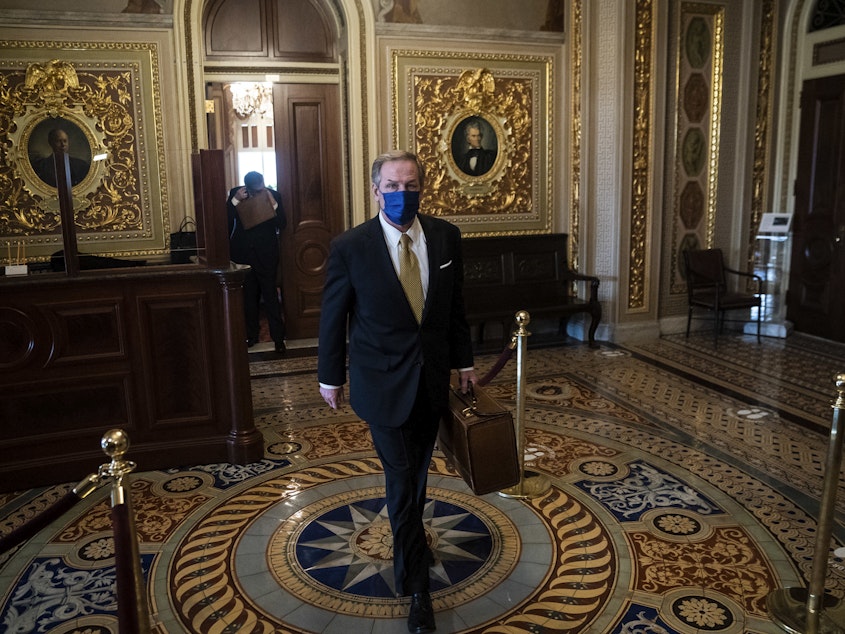Trump's Legal Team Points To 2017 Attempt To Block Election Certification As Defense

Former President Donald Trump's legal team opened its impeachment defense Friday by characterizing the proceedings as an "unjust and blatantly unconstitutional act of political vengeance."
Updated at 5:25 p.m. ET
Attorney Michael van der Veen added it was an abuse of the Constitution that only serves to further divide the nation.
He then unveiled a peculiar defense strategy, arguing that objecting to the outcome of an election and attempting to block certification is a regular practice in American politics. And because of that, Trump's remarks on Jan. 6 before a mob attacked the U.S. Capitol should not be seen as incitement.
As part of his presentation, van der Veen played a roughly 75-second montage from Jan. 6, 2017 when several House members, including lead House impeachment manager Jamie Raskin, D-Md., stood up to disrupt Trump's electoral certification process.
Sponsored
Then-Vice President Joe Biden was presiding over the proceedings. House members rose one-by-one to object the elections results. They cited Russian interference, the legitimacy of the election and electors as well as voter suppression and voting machines.
"Please come to order," Biden said at the time. "The objection cannot be received."
In order for the objections to be considered, they needed to be in writing and signed by both House member and a senator, as NPR's Domenico Montanaro reported at the time. But no senator signed on to that effort.
Later, Raskin referred to the earlier video. He objected in 2017, he said, because the electors from Florida did not follow the letter of the law, saying that under the state's statute you could not be a state legislator and an elector. He said then Vice-President Biden "properly gaveled me down." Raskin noted that "nobody stormed the Capitol" during the 2017 certification.
In fact, the Democrats' objections back then to some electoral votes came nowhere near the legislative or political effort to overturn the election that Trump and his Republican allies staged around the 2020 presidential election.
Sponsored
Van der Veen also pointed to the outcome of the 2000 presidential election going all the way to the Supreme Court as further evidence that is not uncommon that presidential election results are contested.
That election landed in front of the Supreme Court because of a razor-thin margin in Florida.
"To litigate questions of election integrity within this system is not incitement," van der Veen said. "It is the democratic system working as the founders and lawmakers have designed."
He continued: "To claim that the president in any way wished, desired, or encouraged lawless or violent behavior is a preposterous and monstrous lie."
House impeachment managers concluded their opening arguments in the trial on Thursday. Trump faces a single impeachment charge of inciting the deadly insurrection on Jan. 6 that left five people dead.
Sponsored
The House Democrats argue that Trump knowingly and willing whipped up a frenzied pro-Trump crowd and urged them to lay siege to the seat of American government to block lawmakers from certifying Biden's electoral victory and keep Trump in power.
House impeachment managers argued that if senators don't convict Trump, he may incite further violence.
Senators, who are acting as jurors in Trump's historic second impeachment trial, are not expected to convict the former president.
For that to happen 17 Republicans would have to vote with all 50 Democrats to reach the two-thirds threshold to convict and effectively bar Trump from holding federal office in the future.
That outcome, however, seems unlikely. [Copyright 2021 NPR]



